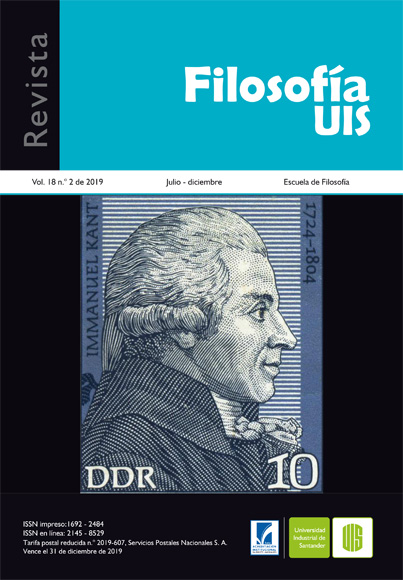Publicado 13-05-2019
Palabras clave
- Inducción Pesimista,
- Realismo Científico,
- Éxito empírico,
- Alternativas no concebidas
Cómo citar
Derechos de autor 2019 Revista Filosofía UIS

Esta obra está bajo una licencia internacional Creative Commons Atribución 4.0.
Resumen
El debate entre los defensores de ciertas versiones del Realismo Científico y los autores que argumentan a favor de la inducción pesimista, sigue abierto. Este estudio fue hecho con el objetivo de mostrar que el argumento de la inducción pesimista representa un reto serio para estas versiones del Realismo Científico. En la primera parte del texto revisaré algunas de las diferentes maneras de caracterizar la inducción pesimista, enfatizando el tipo de compromiso realista con el que discuten, esto es, si es de índole semántico, epistémico o metafísico. En la segunda parte analizo tres estrategias que se han desarrollado para socavar la inducción pesimista, así como los contra argumentos formulados por los defensores de la inducción pesimista ante estos ataques. Muestro que ninguna de estas tres estrategias logra su objetivo. Termino sugiriendo una posible línea de investigación sobre el tema.
Descargas
Citas
Cevolani, G. y Tambolo, L. (2012). Progress as Approximation to the Truth: A Defence of the Verisimilitudinarian Approach. Erkenntnis, 78, 921-935.
Chang, H. (2003). Preservative Realism and Its Discontents: Revisiting Caloric. Philosophy of Science, 70(5), 902-912.
De Solla, D. (1963). Little science, big science... and beyond. New York: Columbia University Press.
Devitt, M. (2007). Scientific Realism. En F. Jackson y M. Smith (eds.), The Oxford Handbook of Contemporary Philosophy. Oxford: Oxford University Press.
Fahrbach, L. (2011). How the growth of science ends theory change. Synthese, 180, 139-155.
Friedman, M. (1996). Objectivity and History. Review work of The Advancement of Science: Science without Legend, Objectivity without Illusions by Philip Kitcher. Erkenntnis, 44(3), 379-395.
Frost-Arnold, G. (2011). From the Pessimistic Induction to Semantic Antirealism. Philosophy of Science, 78(5), 1131-1142.
Held, C. (2011). Truth does not explain predictive success. Analysis, 41(2), 232-234.
Kitcher, P. (1995). Précis of The Advancement of Science. Philosophy and Phenomenological Research, 55(3), 611-617.
Laudan, L. (1977). Progress and Its Problems, Towards a Theory of Scientific Growth. Berkeley: University of California Press.
Laudan, L. (1981). A Confutation of Convergent Realism. Philosophy of Science, 48(1), 19- 49.
Leplin, J. (1992). Realism and Methodological Change. Proceedings of the Biennial Meeting of the Philosophy of Science Association, 1992(1), 435-445.
Lewis, P. (2001). Why the Pessimistic Induction is a Fallacy. Synthese, 129, 371-380.
McMullin, E. (1984). A Case for Scientific Realism. En J. Leplin (ed.), Scientific Realism. Berkeley: University of California Press.
Mizrahi, M. (2013). The Pessimistic Induction: A Bad Argument Gone too Far. Synthese, 190, 3209-3226.
Niiniluoto, I. (2014). Scientific Progress as Increasing Verisimilitude. Studies in History and Philosophy of Science, 46, 73-77.
Park, S. (2014). A Pessimistic Induction against Scientific Antirealism. Organon F, 21(1), 3-21.
Poincaré, H. (1905). Science and Hypothesis. New York: The Walter Scott Publishing Co.
Psillos, S. (1999). Scientific realism: how science tracks truth. London: Routledge.
Putnam, H. (1975). Mathematics Matter and Method. Philosophical Papers Volume I. Cambridge: Cambridge University Press.
Putnam, H. (1978). Meaning and the Moral Sciences. London: Routledge & K. Paul.
Stanford, K. (2006). Exceeding our grasp: Science, history, and the problem of unconceived alternatives. Oxford: Oxford University Press.
Vickers, P. (2017). Understanding the Selective Realist Defence Against the PMI. Synthese, 194, 3221-3232.
Worrall, J. (1989). Structural realism: The best of both worlds. Dialectica, 43, 99-124.
Wray, B. (2013). Pessimistic induction and the exponential growth of science reassessed. Synthese, 190, 4321-4330.

